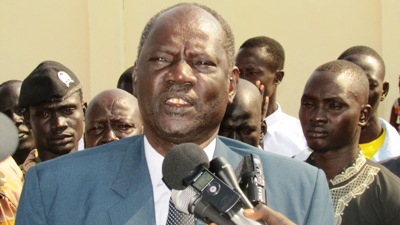South Sudan minister slams SPLM-FDs position over revitalization process
November 4, 2017 (JUBA)- South Sudan’s government said it would not hold consultations with the SPLM Former Detainees (SPLM-FDs) group because they are not a rebel group but part of the ruling coalition.

Last August he accused the group of playing a double game, sometimes they are with the opposition and another with the government. “Their leaders and others are there campaigning against the very government of which they are members. So they should decide,” Lueth told reporters in the South Sudanese capital, Juba on 31 August.
“Last time I stated clearly also that the former detainees must clarify their positions. And I am repeating this again and calling upon former detainees who are here with [us] to clarify their positions.
“They are part of the government, so if they have decided to rebel, they are free to rebel, said Minister Lueth.
“When the council of ministers of IGAD came, the SPLM-FDs declined to attend the meeting as part of the TGoNU, so if they are not part of TGoNU they are free to say whatever they want to say, but that’s not the position of the government,” he stressed.
The former detainees are a group of high-level South Sudan ruling party (SPLM) leaders who were arrested but later released at the start of the country’s civil war in December 2013 before they went into exile in the neighbouring countries.
They are allocated the foreign affairs and agriculture and forestry ministries and deputy foreign affairs post in the ruling interim coalition government.
Lueth’s remarks come in reaction to a proposal dated 15 October 2017 in which the former detainees depicted President Kiir and Machar as the main protagonists whose actions are holding the country hostage out of fears of being held accountable for the crimes their forces committed during the current civil war.
The SPLM-FDs proposed Kiir and Machar should exit power to allow the formation of an alternate government.
“An exit strategy will comprise a package that offers (1) asylum for the two in a willing country or countries, (2) amnesty for specified crimes committed (crimes against humanity, human rights crimes and crime under international humanitarian law) from 15 December, 2013 to the end of the transition or date of the deal, with conditions attached and (3) reasonable financial incentives that assure them of decent living in exile,” reads in part the proposed document obtained by Sudan Tribune.
“To persuade them to give the matter serious thought, this offer must be backed by credible threat of force,” it adds.
In June, a summit of IGAD heads of state and government decided to convene a meeting of the signatories of the South Sudan peace agreement to discuss ways to revitalize the peace implementation. During the June summit, it was agreed that all groups be included in the discussion aimed at restoring a permanent ceasefire.
IGAD unveiled the timetable for the revitalization forum with South Sudanese leaders and the nation’s citizens. It process began on 13 October and ended on 17 October.
The South Sudanese government warned that the revitalization forum by IGAD, the regional bloc which mediated the 2015 peace accord, should not be another platform for negotiations of the peace accord between the two factions to the conflict.
Over a million people have fled South Sudan since conflict erupted in December 2013 when President Kiir sacked Machar from the vice-presidency. Tens of thousands of people have been killed and nearly two million displaced in South Sudan’s worst violence since it seceded from Sudan in July 2011.
(ST)
